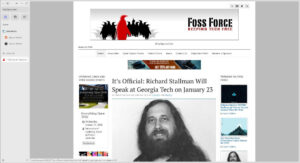Last updated on October 31, 2021
The Firefox browser, which has been experiencing declining use for more than a decade, is the only open source brand included in Fast Company’s ‘Brands That Matter.’

Fast Company has put the open source browser Firefox alongside iconic brands such as McDonalds, Ford, Cosmopolitan Magazine, and IBM as a “brand that matters,” and mama Mozilla couldn’t be prouder.
The monthly print and digital business magazine recently published Brands That Matter, a list of nearly 100 brands it says “have had an undeniable impact on business and culture, far beyond the products they sell.” In addition to Firefox and IBM, tech centered brands making the list include Adobe, Playstation, PayPal, Xbox, and LinkedIn. Other than Mozilla’s browser, no exclusively open source brands are included.
Why Firefox?
Mozilla’s 2020 “Unfck the Internet” campaign, which included a full-page ad in The Washington Post urging Facebook to shut down Groups and for Twitter to do the same with trending topics during the presidential election campaign, were cited by Fast Company as one of the reasons for Firefox’s inclusion.
“Of course, neither company complied, and we’ve been stuck with ‘Stop the Steal’ and worse ever since,” the magazine said, “but Firefox continues to do what it can to put itself forward as the browser that seeks to protect against disinformation and take digital responsibility as hallmarks of its brand.”
Also cited was the RegretsReporter browser extension and the “YouTube Regrets” campaign for dealing with inappropriate YouTube recommendations.
“The Unfck campaign and YouTube Regrets work embody its mission perfectly, illustrating Mozilla’s David versus Goliath relationship with Big Tech, and its work for people over profits and humanity over technology. As these issues become front-page concerns, Firefox’s position and brand has only grown stronger,” Fast Company said.
Mozilla’s Reaction
“It’s an honor to be recognized by Fast Company as a brand whose mission-driven position is only growing larger,” Lindsey Shepard, the chief marketing officer at Mozilla, said in a statement. “Our team continues to put in the time and heart to be the technology company that people can trust. We’re always inspired by the other challenger and mission-oriented brands that are recognized in these lists and we’re glad to be amongst them leading the charge in creating a safe and open internet.”
In a blog, Mozilla pointed out that Brands That Matter is only one of many such awards programs that Fast Company has offered since it began publishing in 1995. In the past, the magazine has awarded Most Innovative Companies, Innovation By Design, and World-Changing Ideas.
“Mozilla will join Fast Company’s progressive and creative community where this roundup will be shared with millions of Fast Company readers,” Mozilla said, “many of whom will learn how Mozilla and Firefox brands work together to show people that it is possible to build a better internet, just by making a few simple choices.”
Firefox in Decline?
While accolades such as this are undoubtedly good for Firefox and might even serve to bring new users to the fold, it’s doubtful this will bring any kind of meaningful change to Firefox’s fortunes.
Although the browser was the first to bring any meaningful competition to Microsoft’s Internet Explorer, which dominated the browser market from the late 1990s through a large portion of the 2010s, Firefox’s share of the browser market has been in a steep decline for more than a decade — from a peak of 32% in 2010 to less than 4% today.
Mozilla’s revenues, however, haven’t reflected that decline as much as might be imagined, partly due to smart maneuvering on Mozilla’s part. Ten years ago, when Firefox’s user base reached its peak, Mozilla’s largest customer, Google, spent a $123 million yearly to be Firefox’s default search engine worldwide. Last year, with Firefox down to only a small fraction of the user-base it commanded a decade earlier, Google paid about $400 million to be the default search engine only in the US — with other search engines such as Yandex and Baidu, paying to be default for search in other countries.
Despite this, Mozilla’s finances appear to be rocky.
In January of last year, the organization fired 70 employees due to cash flow issues, and in August of that year announced a restructuring that closed its operations in Taipei and Taiwan, while also further reducing its workforce in the US, Canada, Europe, Australia, and New Zealand. In total, about 250 people lost their jobs, and about 60 others were reassigned. Mozilla also announced that some of its open source projects would be eliminated or see reduced funding as the organization shifted its focus to income producing projects.
About the same time, it was announced that the deal with Google that had been set to expire in 2020 had been extended until 2023.
Christine Hall has been a journalist since 1971. In 2001, she began writing a weekly consumer computer column and started covering Linux and FOSS in 2002 after making the switch to GNU/Linux. Follow her on Twitter: @BrideOfLinux





Firefox diminished for reasons which need to be found. I knew some of its faults when I used it but I went to Google rather than fight with Firefox and Mozilla. One thing I remember is that the Mozilla help feature is a nightmare. After trying for years, I gave up trying to get through their sign up and login and password mighty blockage. I could never get to actual help but spent hours every time fighting their message that “that email is already in use” Yes you ignorant bastard, it is. By me. Stop telling me I can’t use my own email. Another was the widespread use of arcane programming features to change simple problems as though everyone using Firefox is an advanced developer. It’s an insider’s game, and I felt on the outside as soon as I needed anything slightly different.
Mozilla’s main problem: go woke, go broke.
Brave and Opera are doing the innovating. Focusing on user needs.
$400M for 70 employyes?
Sad but Mozilla will go down. A lesson in humility and not preaching to your users.
Brady,
I agree 100%, once Mozzila decided that political correctness was more important than software functionality, I jumped to Brave.
And I won’t go near anything Google!